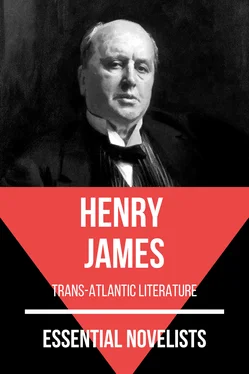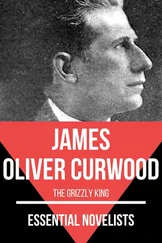“Oh, don’t furbish it, Lord Warburton—, leave it alone. I like it this way.”
“Well then, if you like it, I’m more and more unable to see your objection to what I propose.”
“I’m afraid I can’t make you understand.”
“You ought at least to try. I’ve a fair intelligence. Are you afraid—afraid of the climate? We can easily live elsewhere, you know. You can pick out your climate, the whole world over.”
These words were uttered with a breadth of candour that was like the embrace of strong arms—that was like the fragrance straight in her face, and by his clean, breathing lips, of she knew not what strange gardens, what charged airs. She would have given her little finger at that moment to feel strongly and simply the impulse to answer: “Lord Warburton, it’s impossible for me to do better in this wonderful world, I think, than commit myself, very gratefully, to your loyalty.” But though she was lost in admiration of her opportunity she managed to move back into the deepest shade of it, even as some wild, caught creature in a vast cage. The “splendid” security so offered her was not the greatest she could conceive. What she finally bethought herself of saying was something very different—something that deferred the need of really facing her crisis. “Don’t think me unkind if I ask you to say no more about this to-day.”
“Certainly, certainly!” her companion cried. “I wouldn’t bore you for the world.”
“You’ve given me a great deal to think about, and I promise you to do it justice.”
“That’s all I ask of you, of course—and that you’ll remember how absolutely my happiness is in your hands.”
Isabel listened with extreme respect to this admonition, but she said after a minute: “I must tell you that what I shall think about is some way of letting you know that what you ask is impossible—letting you know it without making you miserable.”
“There’s no way to do that, Miss Archer. I won’t say that if you refuse me you’ll kill me; I shall not die of it. But I shall do worse; I shall live to no purpose.”
“You’ll live to marry a better woman than I.”
“Don’t say that, please,” said Lord Warburton very gravely. “That’s fair to neither of us.”
“To marry a worse one then.”
“If there are better women than you I prefer the bad ones. That’s all I can say,” he went on with the same earnestness. “There’s no accounting for tastes.”
His gravity made her feel equally grave, and she showed it by again requesting him to drop the subject for the present. “I’ll speak to you myself—very soon. Perhaps I shall write to you.”
“At your convenience, yes,” he replied. “Whatever time you take, it must seem to me long, and I suppose I must make the best of that.”
“I shall not keep you in suspense; I only want to collect my mind a little.”
He gave a melancholy sigh and stood looking at her a moment, with his hands behind him, giving short nervous shakes to his hunting-crop. “Do you know I’m very much afraid of it—of that remarkable mind of yours?”
Our heroine’s biographer can scarcely tell why, but the question made her start and brought a conscious blush to her cheek. She returned his look a moment, and then with a note in her voice that might almost have appealed to his compassion, “So am I, my lord!” she oddly exclaimed.
His compassion was not stirred, however; all he possessed of the faculty of pity was needed at home. “Ah! be merciful, be merciful,” he murmured.
“I think you had better go,” said Isabel. “I’ll write to you.”
“Very good; but whatever you write I’ll come and see you, you know.” And then he stood reflecting, his eyes fixed on the observant countenance of Bunchie, who had the air of having understood all that had been said and of pretending to carry off the indiscretion by a simulated fit of curiosity as to the roots of an ancient oak. “There’s one thing more,” he went on. “You know, if you don’t like Lockleigh—if you think it’s damp or anything of that sort—you need never go within fifty miles of it. It’s not damp, by the way; I’ve had the house thoroughly examined; it’s perfectly safe and right. But if you shouldn’t fancy it you needn’t dream of living in it. There’s no difficulty whatever about that; there are plenty of houses. I thought I’d just mention it; some people don’t like a moat, you know. Good-bye.”
“I adore a moat,” said Isabel. “Good-bye.”
He held out his hand, and she gave him hers a moment—a moment long enough for him to bend his handsome bared head and kiss it. Then, still agitating, in his mastered emotion, his implement of the chase, he walked rapidly away. He was evidently much upset.
Isabel herself was upset, but she had not been affected as she would have imagined. What she felt was not a great responsibility, a great difficulty of choice; it appeared to her there had been no choice in the question. She couldn’t marry Lord Warburton; the idea failed to support any enlightened prejudice in favour of the free exploration of life that she had hitherto entertained or was now capable of entertaining. She must write this to him, she must convince him, and that duty was comparatively simple. But what disturbed her, in the sense that it struck her with wonderment, was this very fact that it cost her so little to refuse a magnificent “chance.” With whatever qualifications one would, Lord Warburton had offered her a great opportunity; the situation might have discomforts, might contain oppressive, might contain narrowing elements, might prove really but a stupefying anodyne; but she did her sex no injustice in believing that nineteen women out of twenty would have accommodated themselves to it without a pang. Why then upon her also should it not irresistibly impose itself? Who was she, what was she, that she should hold herself superior? What view of life, what design upon fate, what conception of happiness, had she that pretended to be larger than these large these fabulous occasions? If she wouldn’t do such a thing as that then she must do great things, she must do something greater. Poor Isabel found ground to remind herself from time to time that she must not be too proud, and nothing could be more sincere than her prayer to be delivered from such a danger: the isolation and loneliness of pride had for her mind the horror of a desert place. If it had been pride that interfered with her accepting Lord Warburton such a bêtise was singularly misplaced; and she was so conscious of liking him that she ventured to assure herself it was the very softness, and the fine intelligence, of sympathy. She liked him too much to marry him, that was the truth; something assured her there was a fallacy somewhere in the glowing logic of the proposition—as he saw it—even though she mightn’t put her very finest finger-point on it; and to inflict upon a man who offered so much a wife with a tendency to criticise would be a peculiarly discreditable act. She had promised him she would consider his question, and when, after he had left her, she wandered back to the bench where he had found her and lost herself in meditation, it might have seemed that she was keeping her vow. But this was not the case; she was wondering if she were not a cold, hard, priggish person, and, on her at last getting up and going rather quickly back to the house, felt, as she had said to her friend, really frightened at herself.
––––––––
IT WAS THIS FEELING and not the wish to ask advice—she had no desire whatever for that—that led her to speak to her uncle of what had taken place. She wished to speak to some one; she should feel more natural, more human, and her uncle, for this purpose, presented himself in a more attractive light than either her aunt or her friend Henrietta. Her cousin of course was a possible confidant; but she would have had to do herself violence to air this special secret to Ralph. So the next day, after breakfast, she sought her occasion. Her uncle never left his apartment till the afternoon, but he received his cronies, as he said, in his dressing-room. Isabel had quite taken her place in the class so designated, which, for the rest, included the old man’s son, his physician, his personal servant, and even Miss Stackpole. Mrs. Touchett did not figure in the list, and this was an obstacle the less to Isabel’s finding her host alone. He sat in a complicated mechanical chair, at the open window of his room, looking westward over the park and the river, with his newspapers and letters piled up beside him, his toilet freshly and minutely made, and his smooth, speculative face composed to benevolent expectation.
Читать дальше












